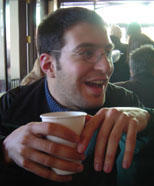Open Letter to the Discovery Institute
I was scanning through your website and found your blog. Very cute. In it these is this "open letter" to Science Magazine where you state:
Alan I. Leshner ("Redefining Science" July 8) says intelligent design isn't science because scientific theories "explain what can be observed" and are "testable by repeatable observations and experimentation." But particular design arguments meet this standard. Biologist Michael Behe, for instance, argues that design is detectable in the bacterial flagellum because the tiny motor needs all its parts to function "is irreducibly complex" a hallmark of designed systems. The argument rests on what we know about designed systems, and from our growing knowledge of the cellular world and its many mechanisms.
How to test and discredit Behe's argument? Provide a continuously
functional evolutionary pathway from simple ancestor to present motor.
Testing ID??? Ha! You guys don't even know what testing means! Testing means to attempt to falsify an idea.
DI guys, you need read some Popper. Here you are proposing to test EVOLUTION. You see evolution would make a prediction that you can test (i.e. "a continuously functional evolutionary pathway from simple ancestor to present motor"). If it fails the test then you've proved that evolution as we know it must be changed or discarded, it says nothing about ID. Furthermore ID makes NO PREDICTION. Think of it, you may test this motor, or how all the parts fit together, or WHATEVER ... and then any result you get you can conclude that THE DESIGNER(OR CREATOR) MADE IT SO. That is why ID is untestable, ID can never force a prediction, it can't be falsified. That is the flaw in you're half-baked arguement.
My oh my. These DI ... ID people. I think you need some real help. I could do a better job advocating for ID than you guys. So next time, before you make a fool of yourselves, run your "open letters" by me, I'LL VOLUNTEER TO PEER REVIEW YOUR CRAZY IDEAS.
And another thing, read the latest research, you may find certain articles about molecular motors that are much more insightful than your thought experiments.


<< Home